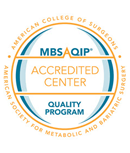The Process Leading to Weight Loss Revisional Surgery
First Step
Before we consider revision weight loss surgery, one of our weight loss surgeons will meet with you either through a video or in-person visit to review your medical history, your records, and understand your concerns. We take a close look at your eating and exercise habits and perform a behavioral assessment to identify a possible cause. We also take into consideration which procedure you already had, as well as your current medical condition.
Physical Exam and Endoscopic Testing
You then undergo a physical examination, and an endoscopic diagnostic procedure to evaluate your anatomy to determine if there is a physical problem.
Understanding Your Options
If revision weight loss surgery is the right next step, we offer you a list of possible options based on your condition. You are encouraged to research these options and bring your questions to an in-person or virtual class where we review those options and determine which revision weight loss surgery is right for you. This is a crucially important step to optimize you for success and ensure your insurance company approves your weight loss revisional surgery. Because these procedures are considered high risk, we want you to understand the benefits and risks of each procedure, and the lifestyle changes you need to make to ensure your surgery is successful.
If You Are Experiencing Serious Complications
If you have an urgent need for revision surgery because you are suffering serious complications, we will ensure you get the care you need as quickly as possible.
Types of Weight Loss Surgery Revisions
There are three basic types of weight loss surgery revisions.
- Conversion procedures convert from one procedure to another.
- Corrective procedures address a complication or an incomplete bariatric treatment that requires correction.
- Reversals restore your anatomy to normal.
Reasons for a Weight Loss Surgery Revision
Insufficient Weight Loss, Weight Regain, or Unresolved/Return of Medical Conditions
While most people have success following weight loss surgery, a small group of people may require additional intervention, and possibly additional surgery, to help them reach their goal. The first step is a comprehensive evaluation of your anatomy and a detailed nutritional and behavioral assessment to identify a possible cause. Depending on your original procedure, we may recommend conversion to another weight loss procedure or corrective surgery.
Complications that Require Corrective Treatment
In some cases, a corrective procedure may be necessary to control or close a leak, fix an obstruction, repair an ulcer, or control bleeding. These conditions are rare but can occur in a small percentage of patients.
Gastric Band Revision Surgery Following Lap-Band Surgery
People who underwent lap-band surgery in the past and are now experiencing chronic complications related to the band or the port may require medical or surgical intervention. Reversing the procedure by removing the band is one option. Converting to a different weight loss procedure is another option. We will review your individual condition and recommend the gastric band revision that's best for you.
